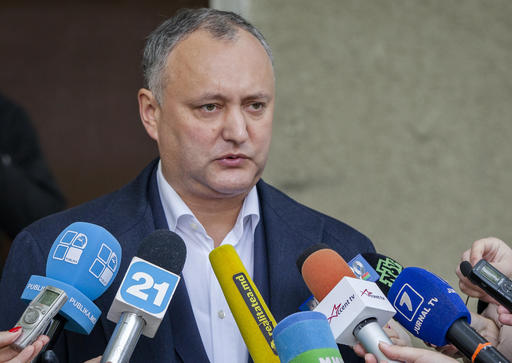Pro-Russia candidate leads in Moldova, early results show

The leader of Socialists Party Igor Dodon speaks to media after casting his vote during the presidential elections in Chisinau, Moldova, Sunday, Oct. 30, 2016. Moldovans began voting Sunday for a president in an election that could move the former Soviet republic closer to Europe or push it back into Russia’s orbit.(AP Photo/Roveliu Buga)
CHISINAU, Moldova — A pro-Russia presidential candidate in Moldova is leading the election with under 52 percent of the vote Sunday, according to preliminary results.
Igor Dodon’s victory in the first round would be a big blow to the pro-Western government, many of whose leading members have been tainted by corruption allegations. Dodon, who favors closer ties with Moscow, tapped into widespread dissatisfaction with high-level graft under the pro-European government that came to power in 2009.
A former Communist Party member, he has pledged to “restore broad and friendly ties with Russia.”
With about 68 percent of the votes counted, Dodon had 51.93 percent of the vote, election authorities ahead. Maia Sandu, an ex-World Bank economist and a pro-European figure who has vowed to be tough with endemic corruption, was in second place with 34.68 percent of the vote. Nine candidates ran for the post, the first time Moldovans have elected a president in 20 years to lead the ex-Soviet republic.
If no candidate secures more than 50 percent of the votes, there will be a runoff on Nov. 13.
Dodon also has vowed to federalize Moldova to include the breakaway region of Trans-Dniester in eastern Moldova, which gets military and economic support from Russia.
But analysts say there is unlikely to be major shifts in foreign policy even if Dodon wins. Moldova’s president has limited powers and all major policies must be approved by Parliament, which is dominated by pro-European parties. The popular election, however, could bring the post more influence and authority.
Both the European Union, together with the U.S. and Russia, seek to have more influence over the impoverished agricultural nation of 3.5 million. Moldova is landlocked between EU member Romania and Ukraine.
Election authorities said turnout was 48.92 percent when polls closed at 1900 GMT (3 p.m. EDT).
Moldova was thrown into political turmoil in 2014 with the disappearance of more than $1 billion from the banking system. Weeks of street protests followed and six prime ministers took office in one year.
“This day is important for Moldova. It will be a new beginning. I voted against those who have been in power for seven years, against the oligarchs and the looting of the banking system,” Dodon said.
Andrei Boico, a 53-year-old worker, said he thought that if Dodon was elected, Moscow would lift a trade embargo on fruit, vegetables and wine that it placed on Moldova in 2014 in retaliation after it signed an association agreement with the EU.
“I think we need to revise our relations with Russia,” Boico said. “Without good relations … we can’t have economic growth.”
Sandu is the preferred option for those who want Moldova to join the European mainstream.
Valentina Cretu, a 41-year-old businesswoman, said she supported Sandu because she had pledged to fight corruption and move closer to the EU.
“Without the EU, Moldova can’t get rid of poverty and corruption,” Cretu said. TVJ